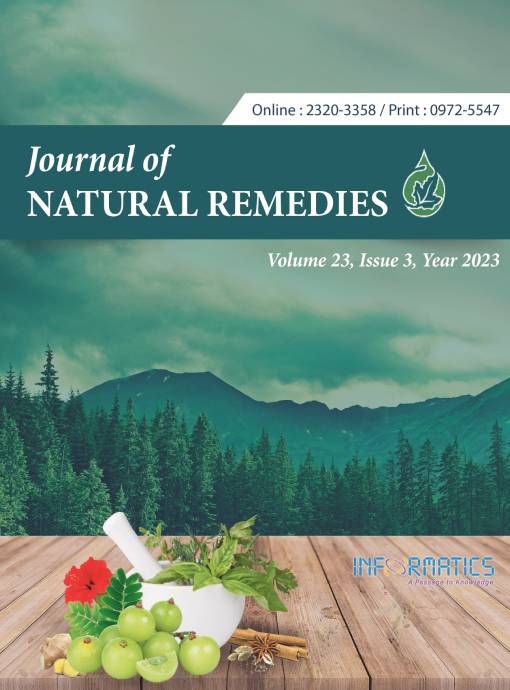Effect of Dill Seed Tea on Lactation Among Postnatal Mothers Admitted in Tertiary Care Hospital
DOI:
https://doi.org/10.18311/jnr/2023/33453Keywords:
Breast Milk Production, Dill Seeds Tea, Lactation, Postnatal MotherAbstract
Breastfeeding is the most beneficial initial nourishment for newborns in terms of health outcomes. Galactagogues are substances that aid in increasing milk production. Galactagogues include herbs such as dill seeds, fenugreek, as well as medications like metoclopramide and domperidone. The objective of this study was to assess the effectiveness of dill seeds tea in promoting lactation among postnatal mothers admitted to a tertiary care hospital. A quasi-experimental research design with a quantitative approach was employed, and data was collected using a convenient sampling technique from 60 postnatal mothers, with 30 participants assigned to the quasi-experimental group and 30 to the control group. The quasi-experimental group received dill seeds tea in the morning for five days, consisting of 1 teaspoon of dill seeds, 200 ml of water, 1 teaspoon of jaggery, and half a teaspoon of cow ghee. The sample selection followed specific inclusion and exclusion criteria. The research tools utilized in the study included a questionnaire to gather demographic and obstetrical data, as well as a Likert scale to assess breastfeeding adequacy in postnatal mothers. The study results revealed that during the pre-test, the majority of the control group (86.7%) experienced inadequate lactation, while 13.3% had satisfactory lactation. In the experimental group, the majority (93.3%) had inadequate lactation, with only 6.7% experiencing satisfactory lactation. During the post-test, the control group had a majority of 76.7% with inadequate lactation. In contrast, the experimental group had 80% with adequate lactation and 20% with satisfactory lactation. The study’s findings indicate that the majority of postnatal mothers in both the experimental and control groups initially experienced insufficient breast milk production, but after receiving dill seeds tea, lactation improved among the postnatal mothers. Therefore, it can be concluded that dill seeds tea was effective in enhancing lactation in postnatal mothers.
Downloads
Metrics
Downloads
Published
How to Cite
Issue
Section
License
Copyright (c) 2023 Vruti Patel, Anita Prakasam, Charmi H. Patel, Charmi M. Patel, Sourabh P. Bhatt (Author)

This work is licensed under a Creative Commons Attribution 4.0 International License.
Accepted 2023-07-10
Published 2023-08-31
References
Sandeep Kaur, Textbook of midwifery and obstetrical nursing, New Delhi; CBS Publishers and Distributors Pvt. Ltd. 2021.
Altmann HW, Benirschke K, et al. Current Topics in Pathology: Ergebnisse der Pathology, Germany, Springer- Verlag; 2013.
Vangroenweghe F, Lamote I, Burvenich C. Physiology of the periparturient period and its relation to severity of clinical mastitis. Domestic animal endocrinology. 2005; 29(2): 283-93. https://doi.org/10.1016/j.domaniend.2005.02.016 PMid:15950428 DOI: https://doi.org/10.1016/j.domaniend.2005.02.016
Ferguson DJ, Anderson TJ. A morphological study of the changes which occur during pregnancy in the human breast. Virchows Arch A Pathol Anat Histopathol. 1983; 401(2):163-75. https://doi.org/10.1007/BF00692642 PMid:6415901 DOI: https://doi.org/10.1007/BF00692642
Leake RD, Waters CB, Rubin RT, Buster JE, Fisher DA. Oxytocin and prolactin responses in long-term breastfeeding, Obstetrics and gynecology. 1983; 62(5):565-8.
Bayyenat S, Hashemi SAG, Purbaferani A, Saeidi M, Khodaee GH. The Importance of Breastfeeding in Holy Quran, International Journal of Pediatrics. 2014; 2(4.1):339- 47. https://doi.org/10.29252/jnkums.7.2.347 DOI: https://doi.org/10.29252/jnkums.7.2.347
Allen J, Hector D. Benefits of breastfeeding. N S W Public Health Bull. 2005; 16(3-4):42-6. https://doi.org/10.1071/ NB05011 PMid:16106271 DOI: https://doi.org/10.1071/NB05011
Chapman DJ, Pérez-Escamilla R. Identification of risk factors for delayed onset of lactation. J Am Diet Assoc. 1999; 99(4):450-4; quiz 455-6. https://doi.org/10.1016/ S0002-8223(99)00109-1 PMid:10207398 DOI: https://doi.org/10.1016/S0002-8223(99)00109-1
Hundera TD, Gemede HF, Wirtu D, Kenie DN. Nutritional status and associated factors among lactating mothers in Nekemte Referral Hospital and Health Centers, Ethiopia. Int J Nutr Food Sci. 2015; 4(2):216-2. https://doi. org/10.11648/j.ijnfs.20150402.23 DOI: https://doi.org/10.11648/j.ijnfs.20150402.23
Javan R, Javadi B, Feyzabadi Z. Breastfeeding: A review of its physiology and galactogogue plants in view of traditional persian medicine. Breastfeed Med. 2017; 12(7):401-409. https://doi.org/10.1089/bfm.2017.0038 PMid:28714737 DOI: https://doi.org/10.1089/bfm.2017.0038
Alhaji S. Some medicinal plants of Arabian Pennisula. Journal of Medicinal Plants Research. 2010; 4(9):767-89.
Josephine Carmel Rani A. A study to assess the effectiveness almond powder on lactation among postnatal mothers at the Institute of Obstetrics and Gynecology, Chennai.
Jakson PC. Complementary and alternative methods of increasing breast milk supply for lactating mothers of infants in the NICU. Neonatal Netw. 2010; 29(4):225-30. https:// doi.org/10.1891/0730-0832.29.4.225 PMid:20630837 DOI: https://doi.org/10.1891/0730-0832.29.4.225
Hekmatzadeh SF, Bazarganipour F, Allan H, Aramesh S, Mohammadi J. Effects of Boiled Dill Seed on Anxiety During Labor: A Randomized Clinical Trial. Chin J Integr Med. 2020; 26(2):100-105. https://doi.org/10.1007/s11655- 019-3222-4 PMid:31705450 DOI: https://doi.org/10.1007/s11655-019-3222-4
Talebi F, Malchi F, Abedi P, Jahanfar S. Effect of dill (Anethum graveolens Linn) seed on the duration of labor: A systematic review. Complement Ther Clin Pract. 2020; 41:101251. https://doi.org/10.1016/j.ctcp.2020.101251 PMid:33130423 DOI: https://doi.org/10.1016/j.ctcp.2020.101251

 Vruti Patel
Vruti Patel









 0.35
0.35 24
24 0.161
0.161